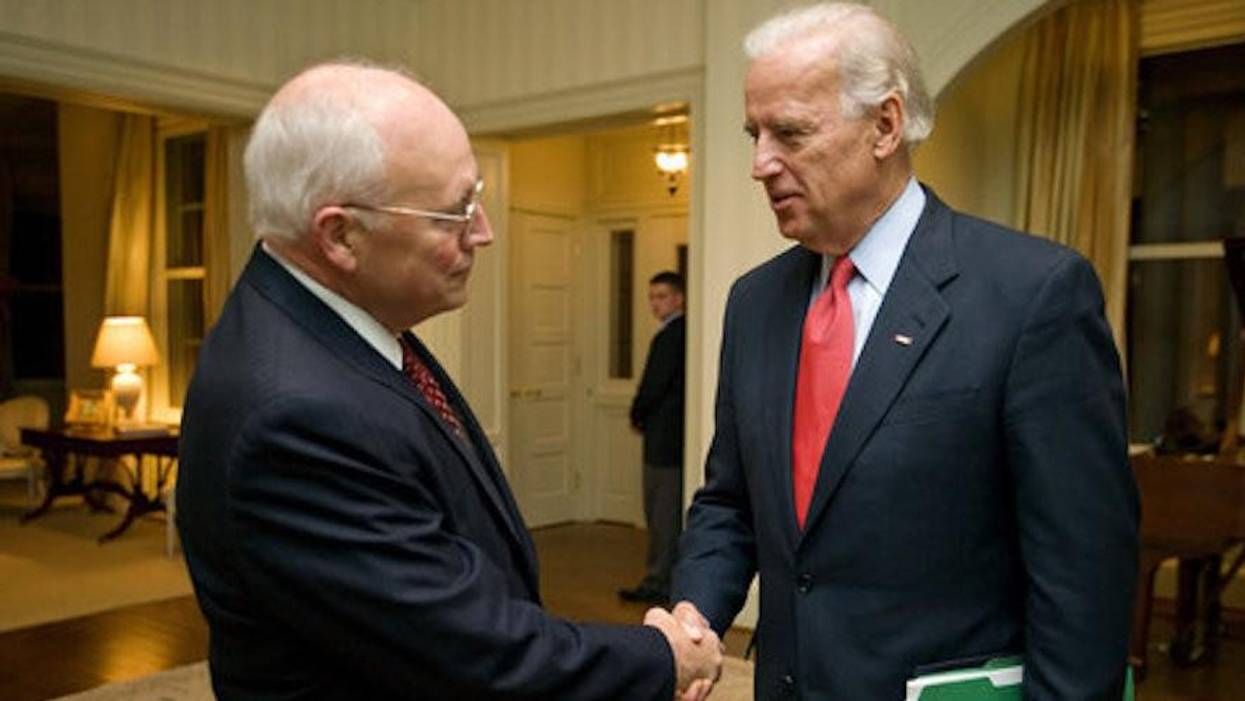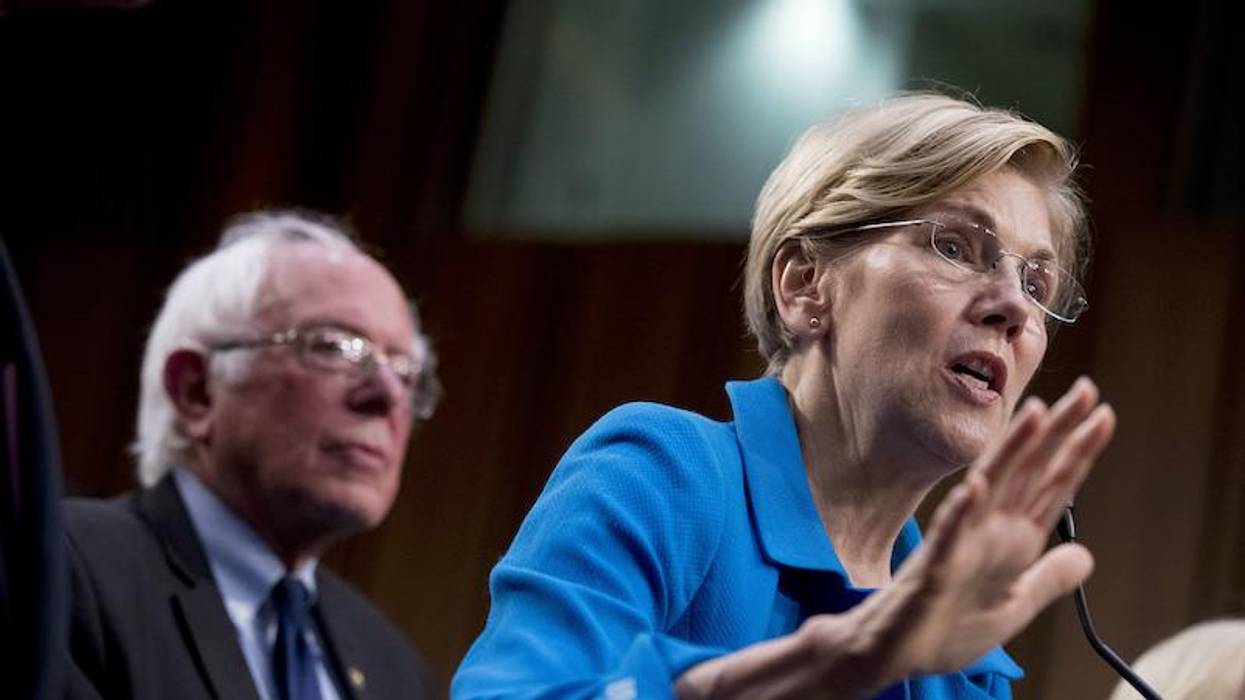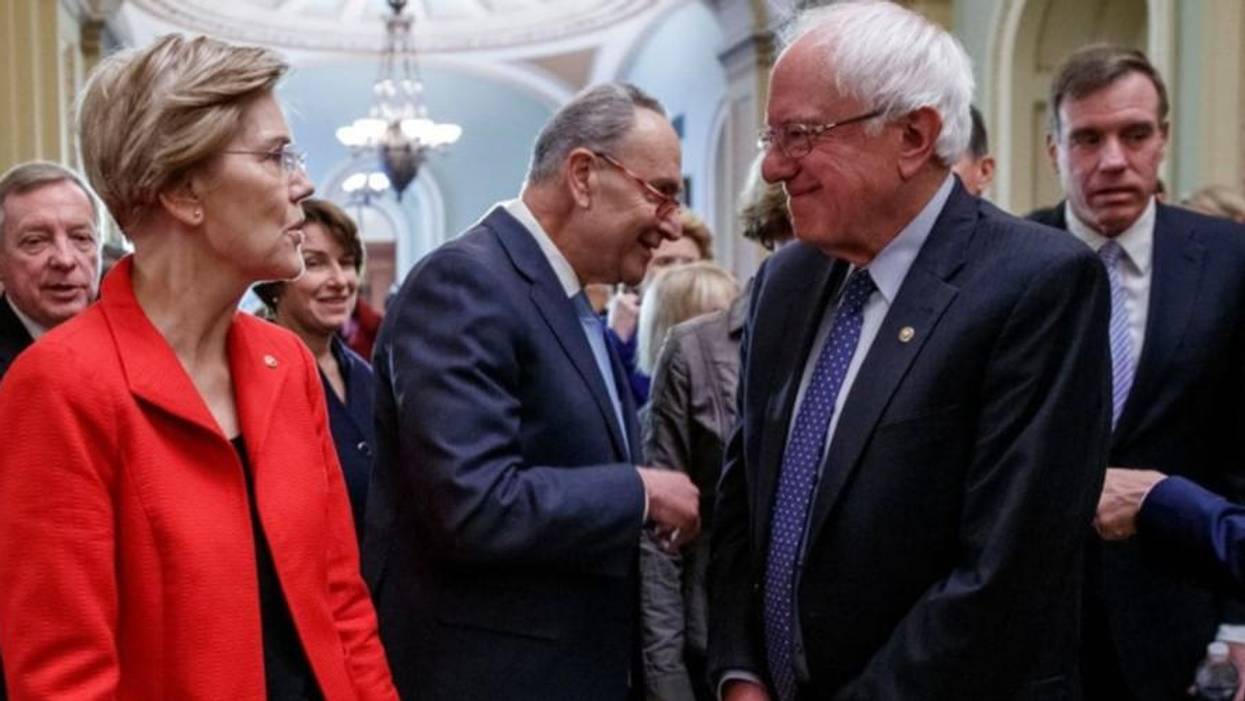Gude sees Warren as "a regulator at heart who believes that capitalism works well as long as fair competition exists," and sees Sanders as "a class-conscious tribune who sees capitalism as fundamentally unjust." He draws a convincing genealogy linking Warren to Brandeis, both legal scholars and activists concerned to regulate the abuses of corporate capitalism, and both liberals (and not radicals or socialists)."Brandeis" he argues, "put his ideals into action in 1910 when he helped settle a New York garment workers' strike. Brandeis, advancing his conception of 'industrial self-government,' assisted in setting up three boards with worker representation that handled labor-management disputes and oversaw labor conditions." Debs, on the other hand, was an anti-capitalist sought to create a "cooperative commonwealth" centered on labor solidarity, struggle, and empowerment. "Power had to be ripped from the employer class through voting and strikes and class unity. No amount of fair-minded bargaining, no amount of cool reasoning, could close the structural gulf between workers and capitalists."
The differences between Brandeis and Debs were surely real. Debs was a revolutionary socialist, an internationalist, and a critic of Wilsonianism and of WWI. Brandeis was a liberal nationalist and a supporter of Wilson and of WWI. The war, and the Bolshevik Revolution, brought these differences to a head; Debs was famously (notoriously, and unjustly) prosecuted by the Wilson Administration for violating the Espionage Act; and Brandeis, as a member of the Supreme Court, joined the unanimous decision, written by Oliver Wendell Holmes, upholding Debs's conviction and imprisonment. Gude's summary is not wrong: "Debs forged cross-border solidarity with democratic forces; Brandeis looked to the benevolent power of the emergent American state." But the general dichotomy he invokes is simplistic and exaggerated. For Brandeis, and the many liberals who supported the war, were also interested in cross-border solidarities, even if not Bolshevik ones (though in the early months of the Bolshevik Revolution, Wilson himself expressed support for the Bolsheviks, something noted even by Debs; this changed with Brest-Litovsk in 1918, though this is another story . . . ). And Debs, and the socialists who joined him in opposing the war (the Socialist party indeed split over this), were also interested in influencing, and perhaps even wielding, the power "of the emergent American state."
More generally, neither the positions represented by Brandeis and Debs, nor the traditions with which they were associated, and which Gude traces forward to Warren and Sanders, were as discrete and at odds as Gude suggests.
First, while it is true that Debs was a socialist and even something of a Marxist, Gude's observation that "he came to this view later in life" is a bit misleading. For as many commentators have noted -- most notably Nick Salvatore in his classic Eugene V. Debs: Citizen and Socialist -- while Debs was surely radicalized over time, his thinking was always suffused with a distinctively American version of civic republicanism. Debs, in short, was something of a Jeffersonian, something that many of the Hamiltonians of his time, such as Herbert Croly, noted and criticized. As Staughton Lynd pointed out years ago in his 1968 Intellectual Origins of American Radicalism, there is a tradition linking Jefferson and Paine, the abolitionists and radical republicans, and 20th Century forms of American radicalism (Croly well understood this tradition, and did not like it). And as Philippa Strum pointed out in her Louis Brandeis: Justice for the People, which Gude cites, Brandeis too was a Jeffersonian, though of a different sort. Debs and Brandeis, then, in spite of real differences, also shared a common ancestor.
Second, while there were clearly some very sharp differences between radicals and liberals during the period in which Debs and Brandeis lived, there were also very important overlaps and collaborations between these traditions, and the boundaries separating them were often very porous.
Indeed, when Debs was famously tried for violating a court injunction against the Homestead strike in 1895, his attorney was the liberal Clarence Darrow (upon his release from his later imprisonment in 1922 for anti-war activities, Debs sent Darrow a personal letter thanking him for his long-standing support and friendship). It was during this incarceration in Woodstock Prison that Debs claimed to have been introduced to Marxism; and it was upon his release, in November 1895, that Debs delivered one of his most famous speeches, "Liberty," a working class republican speech whose touchstone is the Declaration of Independence. And when Debs was convicted in 1918 for violating the Espionage Act of 1917, a wide range of liberals and socialists rallied to his defense, eventually forming the American Civil Liberties Union, a story told beautifully in Ernest Freeberg's Democracy's Prisoner: Eugene V. Debs, The Great War, and the Right to Dissent.
Regarding the porousness of boundaries, consider the case of John Dewey, the most important American liberal philosopher of the 20th Century, whose 1935 book, Liberalism and Social Action, was widely regarded as an important justification for New Deal reform. Dewey, an important contributor to The New Republic since its 1914 creation as the central organ of liberal Progressivism, was also a sympathizer of socialism and a collaborator with socialists. He was involved with the founding of some of the most important liberal organizations of his time, including the National Association for the Advancement of Colored People (1909), the American Association of University Professors (1915), and the American Civil Liberties Union (1920). At the same time, he was a leader of a core organization that brought together the founders of those groups, people such as W.E.B. DuBois, Roger Baldwin, Clarence Darrow, Helen Keller, and Charlotte Perkins Gillman: the Intercollegiate SocialistSociety which, founded in 1905, in 1921 became the League for Industrial Democracy.
Alex Livingston expands on these overlaps in his fine Jacobin piece, "John Dewey's Experiments in Democratic Socialism," observing that: "In 1929, Dewey had become both president of the People's Lobby (formerly the Anti-Monopoly League) and national chairman of the League for Independent Political Action (LIPA). The two groups sought to unite liberals and socialists behind a common program of industrial democracy." During this time Dewey wrote consistently in favor of forming a new third party. He supported Norman Thomas for President in 1932 and 1936. At the same time, his writings during this period helped to inspire many self-styled Progressive liberals, such as A. A. Berle and Rexford Tugwell, to join FDR's administration and to justify New Deal reforms.
And this leads me to the third reason why Gude's opposition of Debs and Brandeis is exaggerated: because by the time of the New Deal there had evolved a productive synergy between Socialist demands and liberal reforms. Gude contrasts Debs's revolutionary activism with Brandeis who helped to settle the garment workers strike by "advancing his conception of 'industrial self-government,' assisted in setting up three boards with worker representation that handled labor-management disputes and oversaw labor conditions." This sounds a lot like the transformational reforms of labor law enacted by the National Labor Relations Act of 1935 and the Fair Labor Standards Act of 1938. The New Deal was surely not a socialist transformation. But it most definitely represented a significant social democratization of American life.
A recognition of this has been central to Bernie Sanders's "political revolution" at least since 2015, when he famously appealed to the example of FDR:
Against the ferocious opposition of the ruling class of his day, people he called economic royalists, Roosevelt implemented a series of programs that put millions of people back to work, took them out of poverty, and restored our faith in government. He redefined the relationship of the federal government to the people of our nation. He combatted cynicism, fear and despair. He reinvigorated democracy. He transformed the country, and that is what we have to do today. . . And, by the way, almost everything he proposed, almost every program, every idea, was called 'socialist.'
As Jedediah Purdy pointed out back then, by making this move, Sanders was exposing the relatively tame and non-revolutionary character of his "democratic socialism."
One can criticize Sanders's nods to liberalism here, as Purdy seemed to do, or one can embrace them, as I am inclined to do. What one cannot do is ignore that Sanders himself, the heir to Debs, considers himself also to be an heir to FDR. This cuts pretty hard against the dichotomy on which Gude rests his piece. And it calls into question the starkness of the choice that Gude insists we must make.
In the end, though, the real question at hand is less how we might interpret the past than how we might make the future. Gude is clear about this:
So why even try to slot Sanders and Warren into political traditions? Isn't this an esoteric exercise of the academic, the tic of the compulsive taxonomist? The short answer is that political figures and thinkers are more than the sum of their assorted policy positions. They have distinct, historically grounded worldviews that, once revealed, can both give us a better handle on their core beliefs and predict how they might act in shifting circumstances.
But if I am right, Sanders and Warren's views are less distinct, and less historically grounded, than Gude admits. On the one hand, the traditions of "socialism" and "liberalism," as truly historical traditions, are themselves contested and evolved; for this reason, it is futile to trace them back unproblematically to their separate origins. And on the other hand, as evolved traditions, "socialism" and "liberalism" have had more productive interactions, and overlaps, than any view of them as distinct can accommodate. In short, more separates Sanders from Debs, and Warren from Brandeis, than Gude allows. And less separates Sanders from Warren than Gude allows, something cast into even starker relief by their common opponent: Trump.
Gude insists on a choice: liberalism or socialism, Warren or Sanders, "hamstrung" idealism about reform, and a presumably "hard-headed" and decisive realism about the need to "rip power" from the capitalist class "through voting and strikes and class unity."
Interestingly, many liberals insist on the same choice, though their preferences are reversed. And so a few months ago Sean Wilentz insisted in Democracy Journal that "liberalism" and "socialism" have "completely different histories, and the differences matter." And a few weeks ago Cass Sunstein went even further, insisting that "Trump is right to warn Democrats about 'Socialism.'"
This is a false choice, or at least a misplaced one.
For it exaggerates differences, and accentuates antagonisms, at a time when the commonalities are much more important, for the sake of both socio-economic justice and the defense of democracy. Don't get me wrong. The differences are real. And debate about them is valuable. But they are debates between two candidates for a Democratic party nomination at a moment where losing (again) to Trump will be a monumental disaster. There is no reason to figure Sanders as Debs, in a century-long contest with Warren as Brandeis. Debs and Brandeis are long gone, and the parties they supported are long gone too. Let Sanders be Sanders, let Warren be Warren, let them debate and run against each other and then come together behind the primary winner.
I think the American left can only benefit from such an approach.
But there is more. Because there is more than the left at play in the coming primary season and even more in the general election.
This is why it is important to remember that the politics of a century ago included Debs, and Brandeis, but also W.E.B. DuBois, and Charlotte Perkins Gillman, and Alice Paul, and a range of other important figures on what we, now, can think of as a broad democratic left.
Today's Democratic primary field is also very wide. It includes Sanders and Warren, and also Kamala Harris, and Corey Booker, and Kirsten Gillibrand, and many others. The choice for democratic socialists, and readers of Jacobin, might be a choice between Sanders and Warren. For many other liberals and left liberals there are other legitimate choices, who represent -- in all meanings of "representation" -- things worth supporting. All of these individuals are now competing for the Democratic Presidential nomination to run against Trump and the Republicans. None of them are assured victory. The competition should be hard, and the debate honest and sharp.
At the same time, there will come a moment when there will be only one Democratic candidate. It will be important for this candidate to win in 2020. I too hope it will be Warren or Sanders. But come November 3, 2020, whoever it is, that candidate must win. And it seems to me that the heirs of Debs and Brandeis and DuBois and Paul and Dewey and FDR and King must do what they can -- what we can -- to make that happen.




